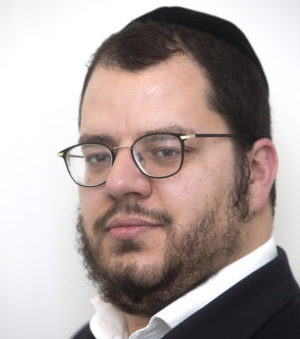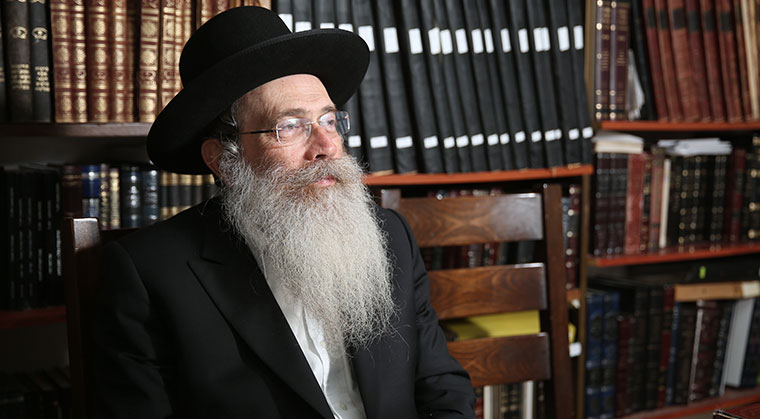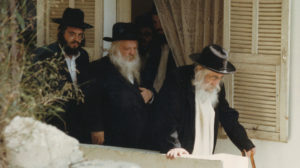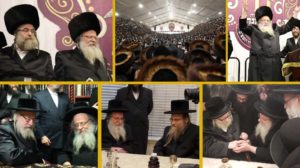Only One Image

An exclusive conversation with Rav Steinman’s beloved son Rav Shraga Noach Steinman, about the little details, the bigger picture, and his father’s enduring legacy

Rav Shraga Noach Steinman shunned the spotlight, but with the passing last month of Rav Aharon Leib ztz”l, Rav Shraga bent his head to his father’s request and took the reins of the massive Orchos Torah network. Yet it’s really in the same hands, because Rav Shraga learned his lessons well (Photos: Eli Cobin)
H
is easygoing nature, keen perception, deep scholarship, and calm indifference to the material rat race that consumes others is a reflection of the light that shined from Rechov Chazon Ish 5 until a month ago.
The walls are encompassed by seforim. Alongside Rishonim and Acharonim are well-worn copies of works of the Ramchal as well as the seforim of Rav Tzaddok HaKohein of Lublin, which Rav Shraga learns regularly. And on the upper shelves stand hundreds of binders crammed with his father’s manuscript of Ayeles Hashachar on all of Shas — Rav Aharon Leib Steinman’s magnum opus — edited and compiled by Rav Shraga.
Rav Shraga Steinman, Rosh Yeshivas Kehillas Yaakov L’Tzeirim, is a prolific writer in his own right, having penned volumes of his original chiddushim, but it never occurred to him to publish his writings during his father’s lifetime.
With the shloshim of Rav Steinman ztz”l last week, the famously reticent Rav Shraga is growing accustomed to a new reality. A sense of responsibility to the wider community has propelled him forward; while Rav Aharon Leib’s door is no longer open to the public for his sage advice, wisdom, and brachos, Rav Shraga is himself a living example of the lessons so many sought.
In fact, his most significant memory of his father’s chinuch was from back in July of 1964, when he was 12 years old and learning in the Ponovezh yeshivah ketanah in Bnei Brak. The fifth Knessiah Gedolah — the World Congress of Agudath Israel — was being held in Jerusalem, and “everyone” was going to be there.
“The entire spectrum of chareidi Jewry was eagerly anticipating the conference,” Rav Shraga tells Mishpacha. “All my friends from yeshivah were planning to go in order to see the gedolei hador. I also wanted to go, and so I asked my father for permission. ‘Why do you want to go to the Knessiah Gedolah?’ he asked. I told him that I’d heard people describe how they’d participated in the prewar Knessios, and had seen the Chofetz Chaim and other gedolim of the previous generation. ‘I also want to tell my great grandchildren that I saw the gedolei hador.’
“My father said, ‘You know what? Tell your great grandchildren that when all your friends went to the Knessiah Gedolah, you stayed in yeshivah and learned.…’
“Naturally, I listened to my father. I was virtually the only one in yeshivah — it was such a landmark event. To this day I recall exactly which room I sat in. I learned from morning to night straight, with my father’s words echoing in my head the whole time, This is what you will tell your great-grandchildren.… So I wasn’t zocheh to be at the Knessiah Gedolah, but I was zocheh to absorb a crucial lesson that has stood me in good stead all my life: Torah study comes before anything else, even before seeing the faces of gedolei hador.”
Looking back, Rav Shraga isn’t sure his father meant that as a universal ruling. “Look, Abba wasn’t a man of mass events — he never participated in public gatherings. Only in his later years, when he felt that a certain responsibility for Klal Yisrael had fallen on his shoulders, did he begin making public appearances. Even when he was a yungerman in Switzerland, people would send him sh’eilos, but leadership was a different story. In the time of Rav Shach, Abba didn’t always agree with him, but he’d say, ‘He’s the leader, so we follow his approach.’ It was the same with Rav Elyashiv. He didn’t always agree with Rav Elyashiv’s rulings, but he supported every decision absolutely, because he saw him as the generation’s leader. Only when there was no one else did Abba agree to accept the leadership.”
(Excerpted from Mishpacha, Issue 694)
Oops! We could not locate your form.













